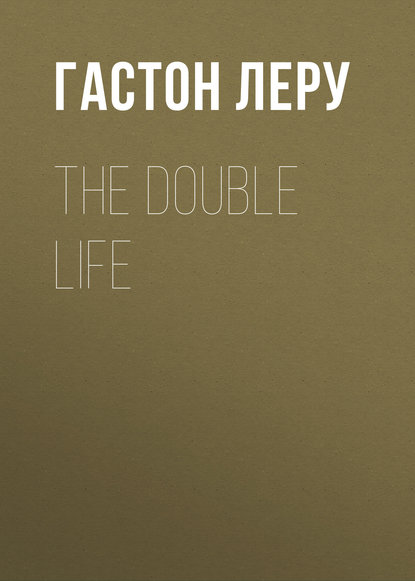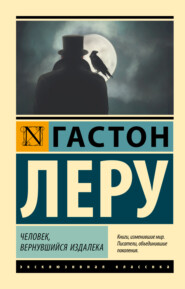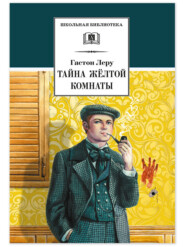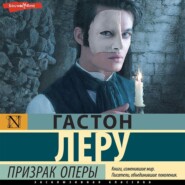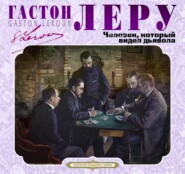По всем вопросам обращайтесь на: info@litportal.ru
(©) 2003-2024.
✖
The Double Life
Автор
Год написания книги
2018
Настройки чтения
Размер шрифта
Высота строк
Поля
“It is horrible,” continued Théophraste, shaking his head. “Then I put the pieces in a basket and threw them into the Seine by the little bridge of the Hotel Dieu. I awoke then, and you may be sure I was not sorry.”
Adolphe struck the table a hard blow with his fist. “It is frightful,” he cried in a harsh voice, looking at Théophraste.
“Is it not?” said Marceline, shuddering.
Adolphe read the first lines of the document.
“Oh, how dreadful it is!” he continued, groaning. “Alas, alas! I understand all, now.”
“What do you understand?” asked Théophraste in a frightened voice, following Adolphe’s finger as he traced the first two lines of the document.
“This,” said Adolphe. “‘Moi et! I buried my, treasures.’ And you do not know what that ‘et’ means? Well, I won’t tell you until I am quite sure. I will know to-morrow. Théophraste, tomorrow at two o’clock be at the Rue Guinegaud and the Rue Mazarin. I am going to take these articles to M. Milfroid’s house. He will restore them to their owners, and we will prove to him that there are pickpockets even when the Commissioner is present. Adieu, my friend, adieu. Above all take courage. Take courage.” Adolphe shook Théophraste’s hand with the warmth of a comrade, and departed.
Théophraste did not sleep that night. While Marceline reposed peacefully by his side, he lay with eyes wide open in the darkness. His respiration was irregular, and he sighed often. Anxiety lay heavy upon him.
CHAPTER IX
The Portrait
DAY broke over the city. A cloudy day, with a mist that enveloped everything in a sinister manner. The sun tried in vain to penetrate that sombre atmosphere.
Mid-day showed a dark red ball, rolling ingloriously in a sulphurous light. Such was the picture of the heavens that day.
Théophraste sprang out of bed early, and awoke Marceline suddenly by an excess of foolish hilarity. Marceline inquired the reason for such strange joyfulness. He said that he could not help laughing at the idea of M. Milfroid, the Commissioner of Police, receiving back the stolen goods which had been pickpocketed right before his very eyes. “My dear Marceline,” he said, “it is foolish, the way people carry the money in their pockets. If you cannot put your hand in, slip a straw, filled with glue, in. It is an excellent scheme for extricating money from people’s pockets.”
Marceline sat up and gazed at him. She could not understand, as he never looked more natural in his life, and yet he was saying peculiar things, and his words were most unnatural.
“Théophraste, you frighten me,” she cried, and in her fear, groaned, “My poor child.”
Théophraste grew terribly angry. He threw himself at his wife, and threatened to strike her. “You know perfectly well that I do not wish to be called a child since the death of Jeanneton-Venes. I am no child.”
Marceline swore that she would never do it again, and in the depths of her soul regretted the unlucky moment which had given her husband proprietorship of a document which had brought into the household such fears and such follies. She knew neither Marie Antoinette, nor Jeanneton-Venes, although he continually referred to them. He had a familiar way of expressing himself about these women which made her uneasy, and finally the unexpected sentences, spoken by Théophraste, and his actions, made her dread the incomprehensible Théophraste of two hundred years ago. It made her long for the former Théophraste, so kind, so easy to understand. Then she gave herself up to bitter reflections upon the theory of reincarnation.
Théophraste finished dressing, and then announcing that he would not breakfast at home, said that he had a rendezvous with his friend Va-de-Bon Cour, at the corner of the Rue Mazarin and Rue Guinegaud, to do a good turn for M. de Francouse, but as that rendezvous was after breakfast, he intended enjoying the air in the Moulin de Chopinette.
“You will leave my green umbrella here,” he said, “and I will take my black feather.” Then, putting the final touches to his cravat, he went out. On the landing he met Signor Petito, the Italian professor, who was also going downstairs. Signor Petito bowed very low, complained of the state of the weather, and complimented Théophraste on his appearance.
Théophraste answered in a less amiable tone, as he was not desiring the Signor’s company, and he demanded of him if Madame Petito could not be induced to learn another air on the piano than “Carnival de Venice.” But Signor Petito replied, smiling, that she was already studying “Love’s Destiny,” but in future she would study only the pieces which would please M. Longuet. He then asked, “Which way are you going?”
“For a turn in the Moulin de Chopinette; but the weather is too bad, so I will have to go down to the Porcherons.”
“To the Porcherons?” Signor Petito was going to ask, but he changed his mind. “Where is the Porcherons?” he asked. “I will go, too.”
“Aha, indeed!” said M. Longuet, glancing curiously at Signor Petito. “You too will go to the Porcherons?”
“Go there or somewhere else,” said Signor Petito, pleasantly, and he followed Théophraste.
At the end of a short silence Signor Petito ventured to ask, “Where are your treasures, M. Longuet?”
Théophraste faced about suddenly. “What has put such an idea into your head?” he exclaimed.
“Do you not remember the day that you brought the specimen of your handwriting and asked for my opinion?”
“I remember, and you were wrong,” said Théophraste drily, as he opened his umbrella.
Signor Petito, in nowise discouraged, placed himself under the shelter of Théophraste’s umbrella. “Oh! M. Longuet, I did not say that to annoy you.”
They arrived at the corner of the Avenue Tre-daine. Théophraste was in very bad humor.
“Monsieur,” he said, “I have an appointment at the tavern of the Veau-qui-telle, by the side of the Chapel Porcherons, here, you see.”
“But we are at the Chapel Notre Dame de Lor-rete, and not the Porcherons, at all.”
Théophraste disregarded Petito’s remark, and suddenly said to him, “Do you know that there is a price on my head?”
Signor Petito seemed taken aback by this sudden change of tone.
“It will cost them dear, though, to get my head,” said Théophraste. “Do you know how much it will cost, Signor, the head of L’Enfant? No? Very well. I am going to tell you, since the occasion has presented itself, and I am going to tell you the whole story, which may be profitable to you.”
Then, without any preparation, he related in the most natural way possible, his existence previous to his present one.
“My head is worth 20,000 pounds,” said he, “and you know it very well.” And as he pronounced these words he struck the table such a blow that Signor Petito recoiled instinctively.
“Here is the history of it all. I was walking, two hundred years ago, in the Rue de Vauregard, with my hands in my pocket, without arms, without even a sword, with the most honest intentions in the world, when a man met me. He bowed almost to the ground, and told me that my face reminded him so much of some one he knew. He was called ‘Old Man Bidel,’ or ‘Bidel the Good-natured,’ and he said that he had a secret to confide to me.
I encouraged him by a friendly tap on the shoulder, and he confided his secret to me. He whispered in my ear that the Regent had promised twenty thousand pounds to whoever would arrest the Enfant, and he knew where the Enfant was hiding. That I looked to him like a man of courage, and that he, with my aid, would do anything to get the 20,000 pounds. He said that he would divide the reward.
“The old man Bidel was on the wrong track, Signor Petito, for I also knew where to find L’Enfant, seeing that I was that person.”
Signor Petito did not wish to believe any of this, as he could see for himself that M. Longuet had been out of infancy a good many years. However, he dared not say anything. Théophraste continued, “I replied to the old man Bidel, that it was a happy chance and that I thanked Heaven for putting him in my path, and I made him conduct me to the place where he could find the Enfaut. He said to me, ‘To-night, the Enfant sleeps at the Capucine, in the Tavern Suite, which bears as a sign the Cross of the St. Hester.’
“It was true, Signor Petito, the old man Bidel was very well informed. I congratulated him, and we passed just then a cutlery shop, and I bought a small knife, much to the astonishment of Bidel, who asked me what I planned to do with such a weapon. I replied to him that with a small knife like this one could kill a fly, and I plunged it into his heart. He sank down, raised his arms wildly for a few moments, and died.”
Signor Petito, who at first had moved away from Théophraste, now rose and ran to the door, and was glad to get out of sight.
M. Longuet drank his wine, got up and went to the Bousset Brewery, where Mme. Barth was standing, making up her books. He said to her, “Mme. Taconet–”
Mme. Barth demanded why he called her Mine. Taconet, but he disregarded her question, and continued, “If Signor Petito comes here again, you will tell him for me that the first time I find him in my way, I will cut his ears off.” Saying this, Théophraste fondled the handle of his umbrella as one grasps the handle of a dagger.
There was no doubt about it, he had his black plume. He had become the Other entirely.
The fog was still thick and he did not think of breakfasting yet. He walked into the sulphurous mist like one in a dream. He crossed the whole of the Quarter of An tin, and that which was formerly the Avenue L’Enrique, until he came under the shadows of the towers of Trinity, which he called the Chateau du Coq. On his arrival at the St. Lazare, he believed that he was at the Petite Pologue.
But little by little the fog cleared away, and his dream disappeared with it. He had the most exact idea of things when he crossed the Point Royale, and by the time he had set foot on the left bank, he was again the honest Théophraste, and had only the vaguest idea of that which had happened on the right bank. But he could remember this, and when he questioned himself thoroughly, he began to experience the different conditions or states of the soul. He discovered in himself three distinct states. First, that which resulted from his life as an actuality, the honest merchant; second, that which resulted from the sudden and momentary resurrection of the Other; and third, that which resulted from memory. The recollection was to him like a third Théophraste, who related to the first what he had known of the second. This resurrection of Théophraste’s was a terrible thing.
On crossing the Bridge he hurried beyond the Rue Guinegaud. He did not care to pass by the corner of the Rue Mazarin, he knew not why. He turned the corner by the Hotel Monniare, and almost ran into Adolphe, who was waiting for him there.
“Have you ever heard of a person called L’Enfant, my dear Adolphe?” he asked.
Adolphe struck the table a hard blow with his fist. “It is frightful,” he cried in a harsh voice, looking at Théophraste.
“Is it not?” said Marceline, shuddering.
Adolphe read the first lines of the document.
“Oh, how dreadful it is!” he continued, groaning. “Alas, alas! I understand all, now.”
“What do you understand?” asked Théophraste in a frightened voice, following Adolphe’s finger as he traced the first two lines of the document.
“This,” said Adolphe. “‘Moi et! I buried my, treasures.’ And you do not know what that ‘et’ means? Well, I won’t tell you until I am quite sure. I will know to-morrow. Théophraste, tomorrow at two o’clock be at the Rue Guinegaud and the Rue Mazarin. I am going to take these articles to M. Milfroid’s house. He will restore them to their owners, and we will prove to him that there are pickpockets even when the Commissioner is present. Adieu, my friend, adieu. Above all take courage. Take courage.” Adolphe shook Théophraste’s hand with the warmth of a comrade, and departed.
Théophraste did not sleep that night. While Marceline reposed peacefully by his side, he lay with eyes wide open in the darkness. His respiration was irregular, and he sighed often. Anxiety lay heavy upon him.
CHAPTER IX
The Portrait
DAY broke over the city. A cloudy day, with a mist that enveloped everything in a sinister manner. The sun tried in vain to penetrate that sombre atmosphere.
Mid-day showed a dark red ball, rolling ingloriously in a sulphurous light. Such was the picture of the heavens that day.
Théophraste sprang out of bed early, and awoke Marceline suddenly by an excess of foolish hilarity. Marceline inquired the reason for such strange joyfulness. He said that he could not help laughing at the idea of M. Milfroid, the Commissioner of Police, receiving back the stolen goods which had been pickpocketed right before his very eyes. “My dear Marceline,” he said, “it is foolish, the way people carry the money in their pockets. If you cannot put your hand in, slip a straw, filled with glue, in. It is an excellent scheme for extricating money from people’s pockets.”
Marceline sat up and gazed at him. She could not understand, as he never looked more natural in his life, and yet he was saying peculiar things, and his words were most unnatural.
“Théophraste, you frighten me,” she cried, and in her fear, groaned, “My poor child.”
Théophraste grew terribly angry. He threw himself at his wife, and threatened to strike her. “You know perfectly well that I do not wish to be called a child since the death of Jeanneton-Venes. I am no child.”
Marceline swore that she would never do it again, and in the depths of her soul regretted the unlucky moment which had given her husband proprietorship of a document which had brought into the household such fears and such follies. She knew neither Marie Antoinette, nor Jeanneton-Venes, although he continually referred to them. He had a familiar way of expressing himself about these women which made her uneasy, and finally the unexpected sentences, spoken by Théophraste, and his actions, made her dread the incomprehensible Théophraste of two hundred years ago. It made her long for the former Théophraste, so kind, so easy to understand. Then she gave herself up to bitter reflections upon the theory of reincarnation.
Théophraste finished dressing, and then announcing that he would not breakfast at home, said that he had a rendezvous with his friend Va-de-Bon Cour, at the corner of the Rue Mazarin and Rue Guinegaud, to do a good turn for M. de Francouse, but as that rendezvous was after breakfast, he intended enjoying the air in the Moulin de Chopinette.
“You will leave my green umbrella here,” he said, “and I will take my black feather.” Then, putting the final touches to his cravat, he went out. On the landing he met Signor Petito, the Italian professor, who was also going downstairs. Signor Petito bowed very low, complained of the state of the weather, and complimented Théophraste on his appearance.
Théophraste answered in a less amiable tone, as he was not desiring the Signor’s company, and he demanded of him if Madame Petito could not be induced to learn another air on the piano than “Carnival de Venice.” But Signor Petito replied, smiling, that she was already studying “Love’s Destiny,” but in future she would study only the pieces which would please M. Longuet. He then asked, “Which way are you going?”
“For a turn in the Moulin de Chopinette; but the weather is too bad, so I will have to go down to the Porcherons.”
“To the Porcherons?” Signor Petito was going to ask, but he changed his mind. “Where is the Porcherons?” he asked. “I will go, too.”
“Aha, indeed!” said M. Longuet, glancing curiously at Signor Petito. “You too will go to the Porcherons?”
“Go there or somewhere else,” said Signor Petito, pleasantly, and he followed Théophraste.
At the end of a short silence Signor Petito ventured to ask, “Where are your treasures, M. Longuet?”
Théophraste faced about suddenly. “What has put such an idea into your head?” he exclaimed.
“Do you not remember the day that you brought the specimen of your handwriting and asked for my opinion?”
“I remember, and you were wrong,” said Théophraste drily, as he opened his umbrella.
Signor Petito, in nowise discouraged, placed himself under the shelter of Théophraste’s umbrella. “Oh! M. Longuet, I did not say that to annoy you.”
They arrived at the corner of the Avenue Tre-daine. Théophraste was in very bad humor.
“Monsieur,” he said, “I have an appointment at the tavern of the Veau-qui-telle, by the side of the Chapel Porcherons, here, you see.”
“But we are at the Chapel Notre Dame de Lor-rete, and not the Porcherons, at all.”
Théophraste disregarded Petito’s remark, and suddenly said to him, “Do you know that there is a price on my head?”
Signor Petito seemed taken aback by this sudden change of tone.
“It will cost them dear, though, to get my head,” said Théophraste. “Do you know how much it will cost, Signor, the head of L’Enfant? No? Very well. I am going to tell you, since the occasion has presented itself, and I am going to tell you the whole story, which may be profitable to you.”
Then, without any preparation, he related in the most natural way possible, his existence previous to his present one.
“My head is worth 20,000 pounds,” said he, “and you know it very well.” And as he pronounced these words he struck the table such a blow that Signor Petito recoiled instinctively.
“Here is the history of it all. I was walking, two hundred years ago, in the Rue de Vauregard, with my hands in my pocket, without arms, without even a sword, with the most honest intentions in the world, when a man met me. He bowed almost to the ground, and told me that my face reminded him so much of some one he knew. He was called ‘Old Man Bidel,’ or ‘Bidel the Good-natured,’ and he said that he had a secret to confide to me.
I encouraged him by a friendly tap on the shoulder, and he confided his secret to me. He whispered in my ear that the Regent had promised twenty thousand pounds to whoever would arrest the Enfant, and he knew where the Enfant was hiding. That I looked to him like a man of courage, and that he, with my aid, would do anything to get the 20,000 pounds. He said that he would divide the reward.
“The old man Bidel was on the wrong track, Signor Petito, for I also knew where to find L’Enfant, seeing that I was that person.”
Signor Petito did not wish to believe any of this, as he could see for himself that M. Longuet had been out of infancy a good many years. However, he dared not say anything. Théophraste continued, “I replied to the old man Bidel, that it was a happy chance and that I thanked Heaven for putting him in my path, and I made him conduct me to the place where he could find the Enfaut. He said to me, ‘To-night, the Enfant sleeps at the Capucine, in the Tavern Suite, which bears as a sign the Cross of the St. Hester.’
“It was true, Signor Petito, the old man Bidel was very well informed. I congratulated him, and we passed just then a cutlery shop, and I bought a small knife, much to the astonishment of Bidel, who asked me what I planned to do with such a weapon. I replied to him that with a small knife like this one could kill a fly, and I plunged it into his heart. He sank down, raised his arms wildly for a few moments, and died.”
Signor Petito, who at first had moved away from Théophraste, now rose and ran to the door, and was glad to get out of sight.
M. Longuet drank his wine, got up and went to the Bousset Brewery, where Mme. Barth was standing, making up her books. He said to her, “Mme. Taconet–”
Mme. Barth demanded why he called her Mine. Taconet, but he disregarded her question, and continued, “If Signor Petito comes here again, you will tell him for me that the first time I find him in my way, I will cut his ears off.” Saying this, Théophraste fondled the handle of his umbrella as one grasps the handle of a dagger.
There was no doubt about it, he had his black plume. He had become the Other entirely.
The fog was still thick and he did not think of breakfasting yet. He walked into the sulphurous mist like one in a dream. He crossed the whole of the Quarter of An tin, and that which was formerly the Avenue L’Enrique, until he came under the shadows of the towers of Trinity, which he called the Chateau du Coq. On his arrival at the St. Lazare, he believed that he was at the Petite Pologue.
But little by little the fog cleared away, and his dream disappeared with it. He had the most exact idea of things when he crossed the Point Royale, and by the time he had set foot on the left bank, he was again the honest Théophraste, and had only the vaguest idea of that which had happened on the right bank. But he could remember this, and when he questioned himself thoroughly, he began to experience the different conditions or states of the soul. He discovered in himself three distinct states. First, that which resulted from his life as an actuality, the honest merchant; second, that which resulted from the sudden and momentary resurrection of the Other; and third, that which resulted from memory. The recollection was to him like a third Théophraste, who related to the first what he had known of the second. This resurrection of Théophraste’s was a terrible thing.
On crossing the Bridge he hurried beyond the Rue Guinegaud. He did not care to pass by the corner of the Rue Mazarin, he knew not why. He turned the corner by the Hotel Monniare, and almost ran into Adolphe, who was waiting for him there.
“Have you ever heard of a person called L’Enfant, my dear Adolphe?” he asked.





